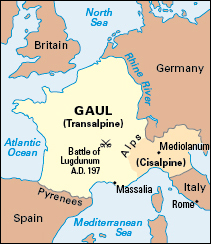Lugdunum, Battle of, << lug DOO nuhm, >> was a battle between the forces of the Roman emperor Lucius Septimius Severus and Clodius Albinus, a rival for the throne. The battle took place outside Lugdunum, Gaul (now Lyon, France) on Feb. 19, A.D. 197. Severus’s victory secured his control of the Roman Empire. It also ended a series of civil wars over the imperial succession. The wars had begun in 193, following the assassination of the emperor Commodus during the previous year.

In 191, Severus became governor of Upper Pannonia, a Roman province in central Europe. He commanded a large Roman army stationed on the Danube River. At that time, the Danube formed part of the Roman Empire’s northern frontier in central Europe. In 193, with the support of his troops, Severus claimed the title of emperor. Severus sought to pacify Clodius Albinus, the Roman governor of Britain and a possible rival for the throne, by offering to make him his Caesar (deputy) and heir.
Pescennius Niger, the Roman governor of Syria, also declared himself emperor. Severus marched east and defeated Niger in what is now Turkey in 194. While Severus was in the eastern part of the empire, Albinus declared himself emperor. He led an army from Britain to Gaul and stationed his forces in the Gallic capital of Lugdunum.
During the winter of 196 to 197, Severus crossed into Gaul from southern Germany. Severus and Albinus, each commanding about 75,000 troops, met outside Lugdunum. Severus’s army was victorious on one of its flanks but suffered defeat on the other. Severus himself was knocked off his horse amidst panic on his army’s left flank. However, a reserve force arrived and Severus’s forces ultimately won the battle.
Severus’s forces captured and burned Lugdunum. Albinus committed suicide and his family was executed. There is no precise record of the number of casualties in the battle or in the brutal capture of the city that followed. But it is likely that the number of soldiers and civilians killed was extremely high, because the important position of emperor was at stake.
See also Commodus ; Severus, Lucius Septimius .
